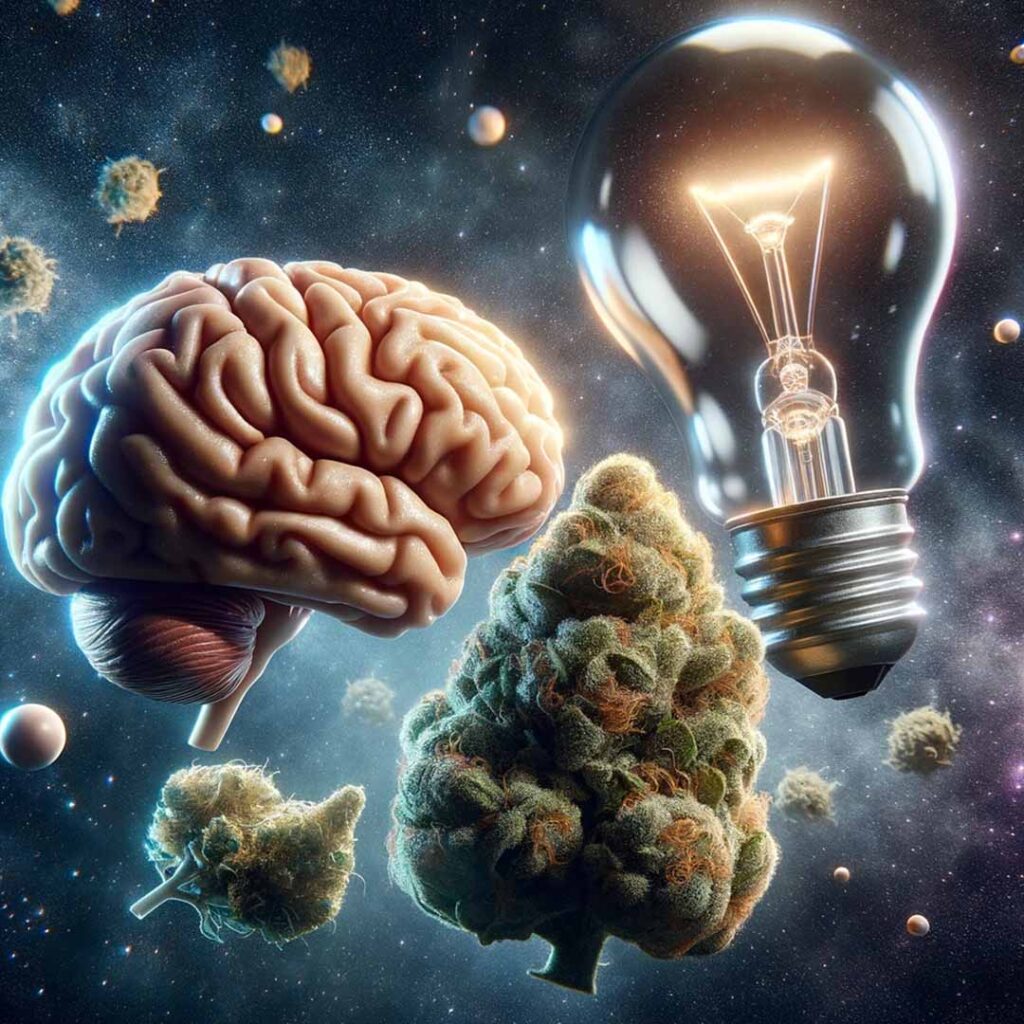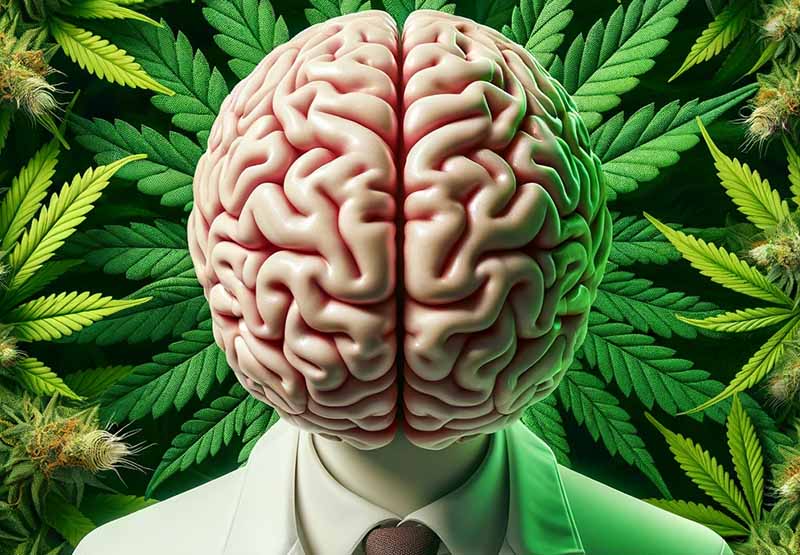The interaction between cannabis and the brain has long been a subject of both curiosity and controversy. As cannabis gains legal status in more regions, understanding its effects on the brain becomes increasingly important. This article delves into the science behind cannabis, focusing on the potential benefits of THC, CBD, and terpenes on brain health, based on current research findings.

Online Dispensary
We found some interesting studies to bring you in this blog, but we also have some interesting products you can shop online for if you live in Maryland or Ohio!
Disclaimer: It’s important to remember that everyone’s endocannabinoid system is unique, and as such, reactions to cannabis can vary significantly from person to person. While certain strains and terpenes have been reported to aid in anxiety management, they may not work universally for everyone. We strongly advise consulting with a healthcare professional or a cannabis specialist to discuss the suitability of specific strains and terpenes for your individual needs.
Does Weed Kill Brain Cells?
One of the most pervasive myths about cannabis is its supposed ability to kill brain cells. Recent studies, however, present a more nuanced picture. Research in this area challenges the long-held belief that cannabis use directly results in the loss of brain cells. For instance, a study published in the Journal of Neuroscience suggests that moderate cannabis use does not significantly affect brain structure. It’s crucial, however, to approach these findings with a balanced perspective, acknowledging that more research is needed to fully understand cannabis’s long-term effects on the brain.
- Positive Benefits: Studies challenge the myth that cannabis kills brain cells, suggesting moderate use doesn’t harm brain structure.
- Product Example: CBD oil, known for its low THC content, exemplifies a cannabis product that supports brain health without significant psychoactive effects.
- Medical Reference: A Journal of Neuroscience study indicates moderate cannabis use does not significantly affect brain structure, advocating for more nuanced understanding.

Can Brain Cells Regenerate?
The human brain has a remarkable capacity for neurogenesis, the process of generating new neurons. This ability is a key area of interest in studying the effects of cannabis on the brain. Some research indicates that compounds in cannabis, particularly CBD, might have neuroprotective properties that could support brain health and potentially foster neurogenesis. For example, a study in the British Journal of Pharmacology highlights CBD’s potential to promote hippocampal neurogenesis. While these findings are promising, they underscore the need for further investigation.
- Positive Benefits: Research shows CBD might have neuroprotective properties, supporting brain health and potentially encouraging neurogenesis.
- Product Example: CBD-infused supplements designed for cognitive support highlight the therapeutic potential of cannabis.
- Medical Reference: The British Journal of Pharmacology outlines CBD’s ability to promote hippocampal neurogenesis, underscoring the need for continued exploration.
What Does THC Do to the Brain?
THC, the psychoactive component of cannabis, interacts with the brain’s endocannabinoid system, influencing various functions, including mood, pain sensation, and appetite. Despite concerns about its psychoactive effects, THC has shown potential therapeutic benefits. Research indicates that THC may have neuroprotective qualities and could play a role in regulating mood and relieving pain. These findings suggest that THC’s interaction with the brain is complex and not solely detrimental.
- Positive Benefits: THC interacts with the endocannabinoid system to offer neuroprotective qualities and aid in mood regulation and pain relief.
- Product Example: THC-based tinctures for therapeutic use demonstrate how controlled THC consumption can benefit the brain.
- Medical Reference: Research suggests THC’s neuroprotective and mood-regulating benefits, challenging views on its psychoactive effects.

CBD Effects on Brain
Unlike THC, CBD does not produce psychoactive effects, making it an area of interest for its potential therapeutic benefits. Studies have explored CBD’s impact on anxiety, cognitive function, and neuroprotection. For instance, research suggests that CBD may help reduce anxiety and improve sleep, potentially by altering brain response to anxiety-inducing stimuli. This points to CBD’s beneficial role in supporting brain health, particularly in stress-related and cognitive contexts.
- Positive Benefits: CBD’s non-psychoactive effects contribute to reducing anxiety and supporting cognitive functions.
- Product Example: CBD gummies for anxiety relief provide a practical example of CBD’s positive effects on the brain.
- Medical Reference: Studies, such as those suggesting CBD can alter brain responses to anxiety, highlight its potential in stress-related contexts.
How Do Terpenes Affect the Brain?
Terpenes, the aromatic compounds in cannabis, are not only responsible for the plant’s distinct smells but also contribute to its therapeutic effects. Research into terpenes like limonene and pinene suggests they may improve mood and cognitive function. These compounds interact with the brain in ways that could enhance well-being, making them a significant area of study in cannabis research.
- Positive Benefits: Terpenes like limonene and pinene may improve mood and cognitive function, enhancing well-being.
- Product Example: Terpene-rich essential oils used in aromatherapy underscore the mood-enhancing properties of these compounds.
- Medical Reference: Research into how limonene and pinene affect the brain supports their potential for mood improvement and cognitive benefits.
The relationship between cannabis and the brain is intricate and multifaceted. While there is concern over potential adverse effects, current research also uncovers the beneficial impacts of THC, CBD, and terpenes on brain health. As the scientific community delves deeper into these compounds, it’s clear that cannabis holds both challenges and opportunities for understanding brain function. Continued research and an open dialogue are essential for navigating the complexities of cannabis and its place in both medicine and society.
Shop Cannabis Online
Explore our curated selection of cannabis-infused skin care products at Bloom in Maryland and Ohio. If you’re not into that, stop on by and pick up some medical or recreational cannabis (where applicable)

Ohio Bloom Dispensaries:
Ohio boasts a selection of top-notch medical dispensaries, and Bloom proudly operates in 5 convenient locations across the state. If you’re seeking high-quality medical marijuana, choose a city near you and visit us at Bloom. We look forward to serving you soon!
- Bloom – Akron Medical Menu
- Bloom – Columbus Medical Menu
- Bloom – Maumee Medical Menu
- Bloom – Painesville Medical Menu
- Bloom – Seven Mile Medical Menu
Maryland Bloom Dispensary:
Bloom is thrilled to serve both Medical Marijuana Patients and Recreational Customers at our Germantown Dispensary in Maryland. Our dispensary offers a curated selection of premium cannabis products, perfect for those seeking deep relaxation or euphoric bliss. Discover a world of quality cannabis experiences with us in Germantown!

